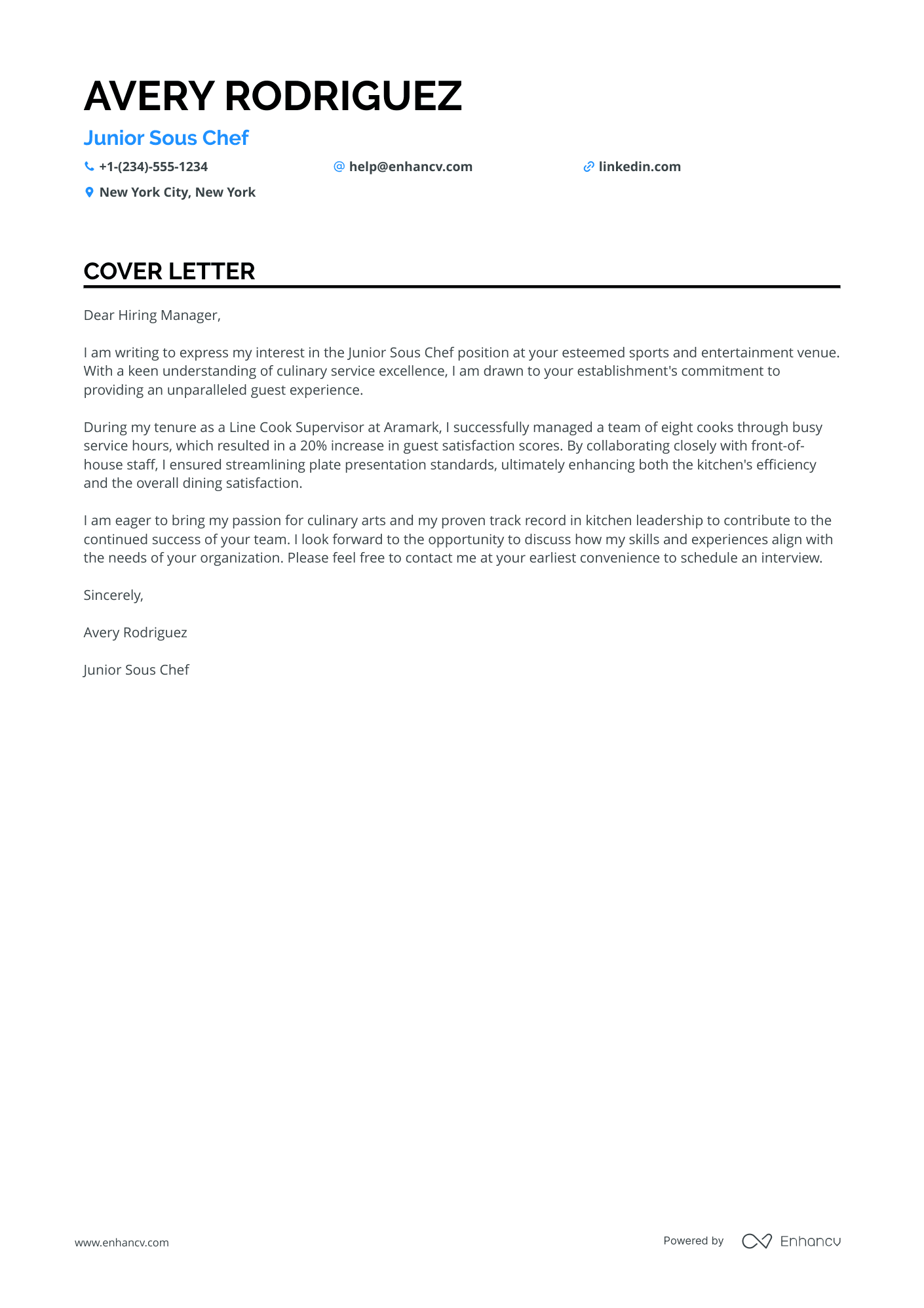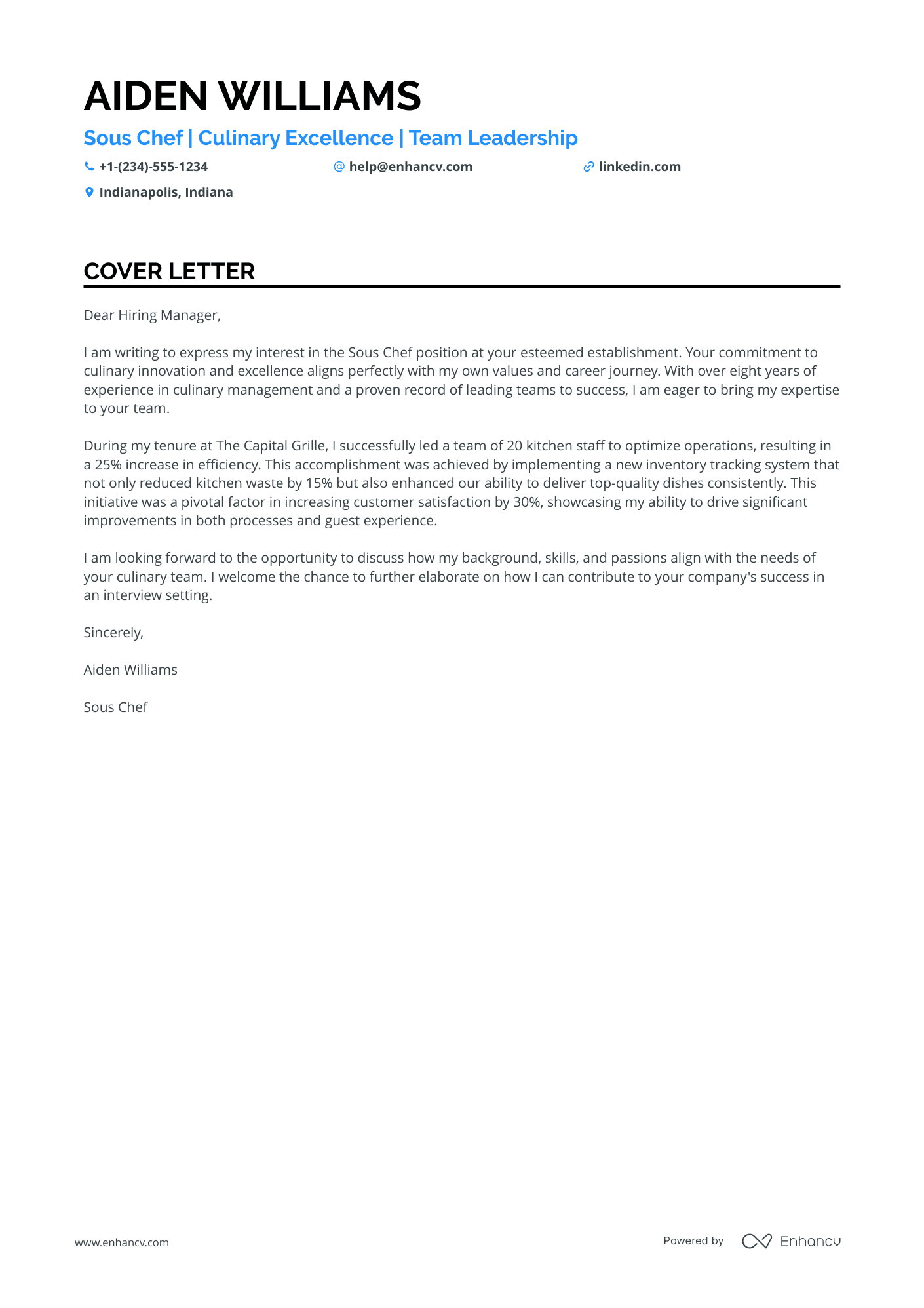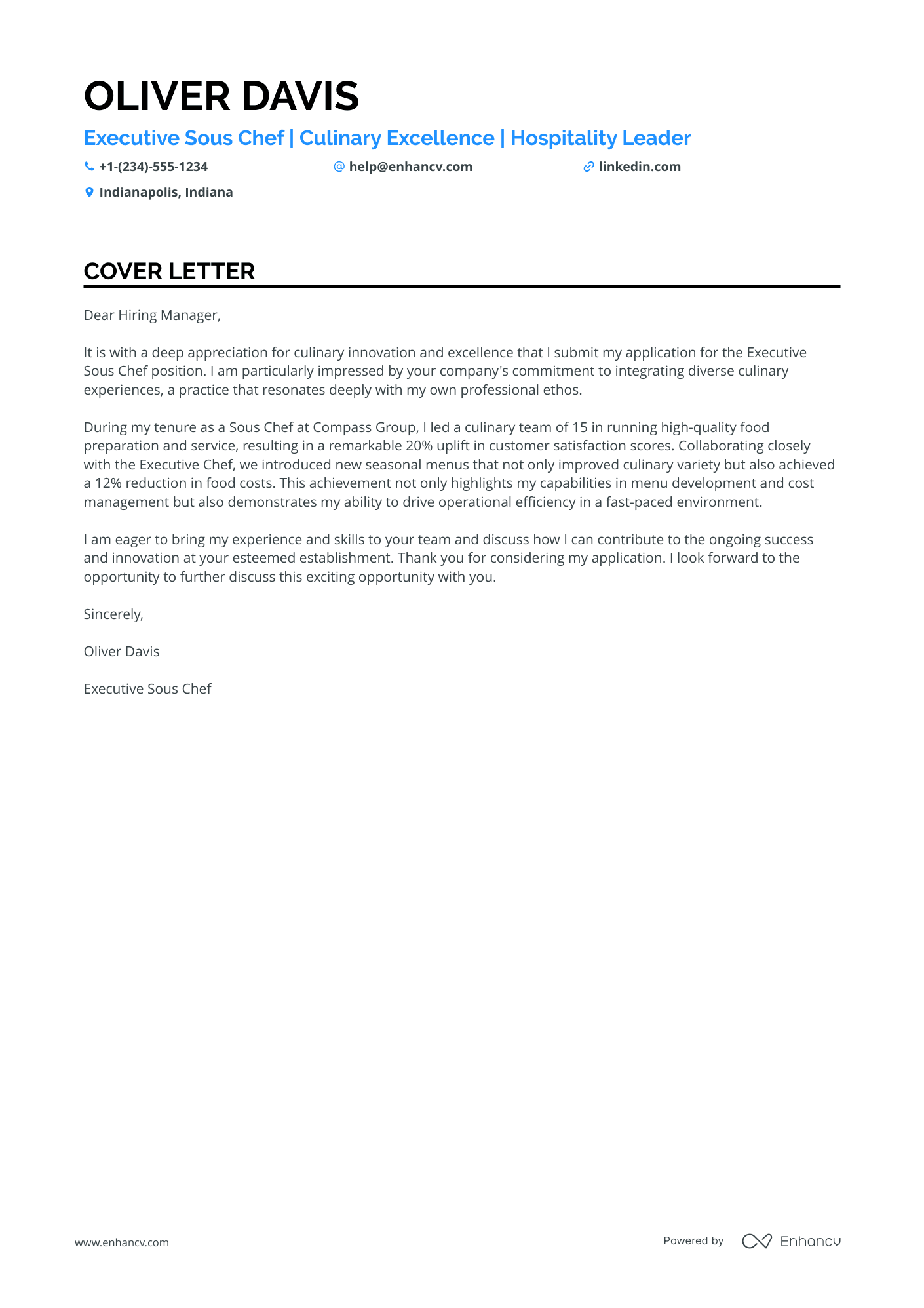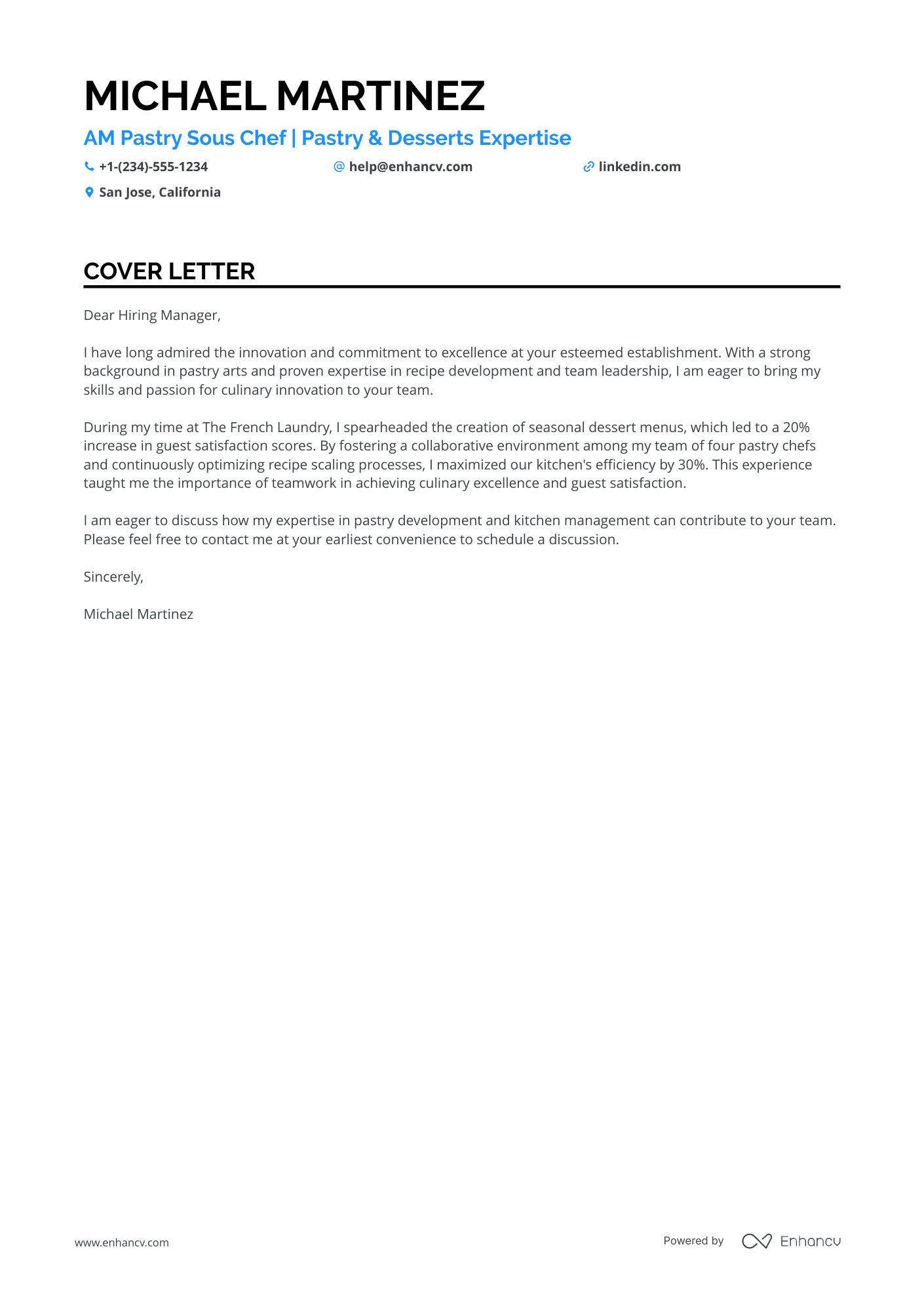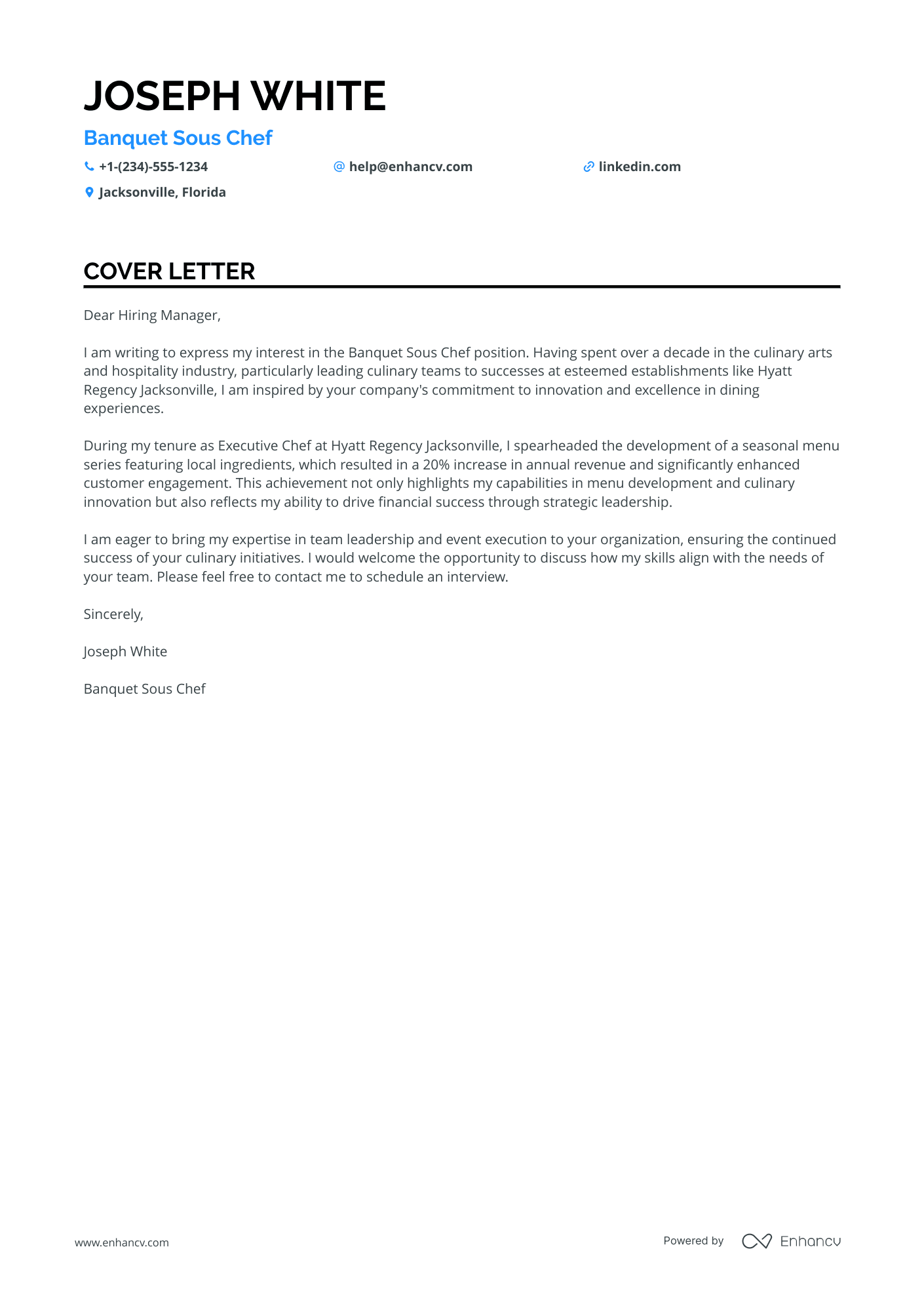Embarking on your culinary career path, you've likely found that crafting the perfect sous chef cover letter can be daunting. You know it's not just about rehashing your resume—it's about telling your unique professional story, proudly highlighting that one standout achievement, and doing so without falling into the trap of tired clichés. Balancing formality with engaging content in a single page is no small feat, but armed with the right tips, you can serve up a cover letter that will get you noticed. Let's dive into creating a memorable introduction to your culinary prowess.
- Some inspiration from other professionals' job-winning cover letters;
- The best structure and format for your sous chef cover letter;
- Insights on how to write about your best achievement to stand out;
- A creative twist on your sous chef cover letter intro.
Upload your sous chef resume to Enhancv's AI, which will quickly scan and prepare a job-winning cover letter for you.
If the sous chef isn't exactly the one you're looking for we have a plethora of cover letter examples for jobs like this one:
Drop your resume here or choose a file.
PDF & DOCX only. Max 2MB file size.
Sous chef cover letter example
ISAAC HALL
San Diego, California
+1-(234)-555-1234
help@enhancv.com
- Demonstrating tangible achievements (such as reducing food waste by 15% and increasing customer base by 10%) showcases the candidate's ability to improve operations and drive business success, key for a sous chef role.
- Emphasizing a proactive approach to staff training and management resulting in decreased turnover indicates leadership and people management skills, which are critical for a sous chef responsible for kitchen staff.
- Mentioning experience in reputable establishments highlights a background of high standards and aligns with the expectations of an upscale restaurant, validating the candidate's fit for the role.
Five tips on formatting your sous chef cover letter
Do you want to make a good impression on recruiters and, at the same time, follow the best industry advice on writing your sous chef cover letter?
Make sure to include the following:
- Header and Salutation;
- Introductory paragraph;
- Body paragraph;
- Closing paragraph;
- Signature (this one is up to you).
Remember to use the same modern, simple font for your sous chef cover letter as you did for your resume (e.g. Lato, Rubik, etc.)
Ensure your sous chef cover letter is single-spaced and is wrapped around a one-inch margin, like in our cover letter templates.
Once completed, use our cover letter builder to export your sous chef cover letter in the best format to keep your information intact - PDF.
At the end of the day, your sous chef cover letter won't be assessed by the Applicant Tracker System (ATS) software, but by the recruiters. Your information should thus be legible, organized, and follow a structured logic.
Writing cover letters just got easier. Use our free cover letter generator to create yours instantly.
The top sections on a sous chef cover letter
- Header: Includes the sous chef's contact information, the date, and the employer's details, because it ensures the recipient knows how to respond and acknowledges the tailored nature of the cover letter.
- Greeting: Should be addressed to the specific hiring manager or chef if known; a personalized greeting demonstrates the applicant's attention to detail and respect for professional hierarchy in the culinary industry.
- Introduction: Briefly introduce professional background and express enthusiasm for the position; this captures the recruiter's interest and sets the tone for the cover letter, reflecting the passion required for the culinary arts.
- Body: Highlight specific culinary skills, experience in menu development, kitchen management, and examples of past achievements, showing relevance to the sous chef role and providing evidence of competence and creativity in food preparation.
- Closing: Express earnest desire for a personal interview and proactively suggest follow-up, reflecting a sous chef's proactive and punctual mindset crucial for the fast-paced kitchen environment.
Key qualities recruiters search for in a candidate’s cover letter
- Proven culinary skills and a strong understanding of diverse cooking techniques and cuisines, demonstrating the ability to support the head chef with menu creation and execution of dishes.
- Previous experience managing or supervising kitchen staff, highlighting leadership qualities and the capacity to maintain a harmonious and efficient back-of-house operation.
- A solid track record of kitchen management, including inventory control, ordering supplies, and budgeting, which shows an understanding of the business side of a culinary operation.
- A commitment to maintaining high standards of food safety and hygiene, with knowledge of relevant regulations and certifications, ensuring a safe dining experience for patrons.
- Adaptability and problem-solving abilities, showcasing the capability to handle a fast-paced and often stressful environment by making quick decisions and adjustments as needed.
- Excellent communication and interpersonal skills, crucial for collaborating with the head chef, kitchen staff, and front-of-house teams, as well as providing mentorship and training to junior kitchen staff.
The sous chef cover letter salutation: how to address hiring managers
After covering the format of your sous chef cover letter, let's look at the salutation.
Back in the day, the cordial "To whom it may concern" or "Dear Sir/Madam", might have worked out fine.
But, nowadays, your cover letter should approach hiring managers on a more personal basis.
So, what to do about your cover letter salutation?
If you've messaged the recruiters and are on a first name basis or a more formal one, use the hiring manager's name in the greeting (e.g. "Dear Sophie," "Dear Ms. Givens", or "Dear Mr. Everett,").
Always aim to make the effort to find out the name of the hiring manager, who'd be assessing your application. Search on LinkedIn, double-check the advert on the corporate website, or message the brand on social media to find out more about the role.
If you can't find the hiring manager's name (and still want to sound professional), use "Dear HR Team,", "Dear Hiring Manager,", or the likes.
List of salutations you can use
- Dear Hiring Manager,
- Dear Executive Chef [Last Name],
- Dear Ms./Mr. [Last Name],
- Dear Chef [Last Name],
- Dear Kitchen Manager,
- Dear [Restaurant Name] Team,
Using your sous chef cover letter intro to show your dedication
We know just how difficult it is to start writing your sous chef cover letter introduction.
There are so many great qualities you have as a professional, which one should you choose?
How about writing up to two sentences about your passion and commitment to the work you do or are set to do?
Try to describe exactly what you enjoy about the potential role.
A positive attitude from the get-go will help you stand out as a motivated sous chef professional.
Structuring your sous chef cover letter body to add more value
You've hinted at your value as a professional (this may be your passion for the job or interest in the company) in your introduction.
Next, it's time to pan out the body or middle of your sous chef cover letter.
When creating your resume, you've probably gone over the advert a million times to select the most relevant skills.
Well, it's time to repeat this activity. Or just copy and paste your previous list of job-crucial requirements.
Then, select one of your past accomplishments, which is relevant and would impress hiring managers.
Write between three and six paragraphs to focus on the value your professional achievement would bring to your potential, new organization.
Tell a story around your success that ultimately shows off your real value as a professional.
A sincere and original way to end your sous chef cover letter
When writing their sous chef cover letter, candidates tend to use one of these phrases, "Sincerely yours" or "I look forward to hearing from you".
Both statements show good manners, but your cover letter should end in a more actionable manner.
Write about:
- how you see yourself growing in the role/organization;
- the benefits you would bring about (you'd impress even more with tangible metrics);
- the next steps in the process (provide your availability for interviews).
The zero experience sous chef cover letter: shifting the focus to your unique value
Don't worry if you have no conventional professional experience. Within your whole experience, there's plenty more you can write about in your sous chef cover letter.
Take, for example, your biggest achievement or award - dedicate your cover letter body to describe it and the job-relevant skills you've learned.
Your professional ambitions could also take center stage. Describe what you plan on achieving in the next five to ten years and the efforts you're making towards your dreams.
Key takeaways
Turning your sous chef cover letter into a success is all about staying authentic to yourself and relevant to the job:
- Be creative with your sous chef cover letter introduction by stating something you enjoy about the company (that is genuine) or about your skill set (to get the recruiters' interested);
- Use single spacing and have a one-inch margin wrapping all around the content of your sous chef cover letter;
- Select just one past achievement from your career or life to tell a story of how you've obtained job-crucial skills and how they'd be beneficial to the role;
- The finishing paragraph of your sous chef cover letter doesn't necessarily have to be a signature but could be a promise of what you plan to achieve in the role;
- Instead of focusing on your lack of experience, spotlight your transferable skills, one relevant achievement, and career dreams.
Sous Chef cover letter examples
By Experience
Junior Sous Chef
- Emphasize teamwork and leadership skills by highlighting experience in managing a team, essential for a Junior Sous Chef role where coordinating a kitchen team is crucial.
- Provide specific achievements, such as the increase in guest satisfaction scores, to demonstrate capability in enhancing customer experience and operational efficiency.
- Show an understanding of the establishment's goals, such as a commitment to an unparalleled guest experience, to align your personal goals with those of the organization.
- Express enthusiasm for culinary arts and a willingness to contribute to the team's success, which reflects a positive attitude and readiness to advance in the culinary field.
Senior Sous Chef
- Highlighting Achievements: The letter effectively emphasizes significant achievements such as leading a team to increase efficiency by 25% and reducing kitchen waste, which demonstrates the ability to oversee high-functioning kitchen operations and improve cost-efficiency.
- Quantifiable Impact: The inclusion of specific metrics, like the 30% increase in customer satisfaction, provides tangible evidence of the candidate’s impact, which is crucial in the hospitality industry where guest experience is paramount.
- Alignment with Company Values: By expressing shared values of culinary innovation and excellence, the candidate strategically aligns their professional goals with the employer's mission, showing they are not only qualified but also a good cultural fit.
- Industry Experience: With over eight years of culinary management experience, the letter assures the employer of the candidate’s deep understanding and competence in the field, essential for a senior kitchen role like Sous Chef.
By Role
Executive Sous Chef
- Emphasize relevant leadership experience: Highlight any experience in leading culinary teams or managing kitchen staff, as this demonstrates capability in overseeing kitchen operations and coordinating team efforts.
- Quantify achievements: Use specific metrics, such as percentage improvements in customer satisfaction or reductions in food costs, to give concrete evidence of success and impact in prior roles.
- Showcase collaboration with senior team members: Highlighting collaboration with an Executive Chef demonstrates the ability to work effectively in hierarchical structures and contribute to higher-level decision-making and strategy.
- Align with company values: Connect personal professional ethos or achievements with the company's goals or values, such as culinary innovation and diversity, to show alignment and genuine interest in the role.
Pastry Sous Chef
- Highlighting relevant experience: The cover letter emphasizes prior experience at a renowned establishment (The French Laundry), which adds credibility and showcases a high level of expertise and prestige applicable to the pastry chef role.
- Demonstrating results: The letter quantifies achievements such as a 20% increase in guest satisfaction scores and a 30% improvement in kitchen efficiency, highlighting the candidate's ability to deliver tangible improvements and positive outcomes.
- Showcasing leadership skills: Mentioning the leadership of a team of four pastry chefs indicates strong managerial and collaborative skills, which are valuable for a key role in culinary environments.
- Expressing enthusiasm for the role: By directly addressing admiration for the company and expressing eagerness to contribute, the candidate shows a strong personal motivation and genuine interest in joining the team.
Banquet Sous Chef
- Emphasize leadership experience and successful track record in managing culinary teams, as shown by taking on roles such as Executive Chef, to demonstrate ability to lead in a high-pressure environment.
- Highlight specific achievements, such as increasing annual revenue through the introduction of a seasonal menu with local ingredients, to showcase expertise in menu innovation and financial impact.
- Showcase an understanding of the company's values and goals, like innovation and excellence in dining experiences, to establish a connection and demonstrate alignment with the organization’s mission.
- Express a willingness to contribute to the company’s success and invite the opportunity for an interview, creating an impression of eagerness and proactive engagement.
